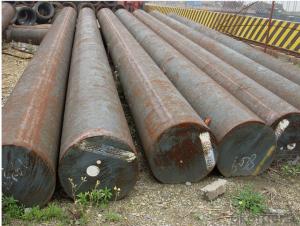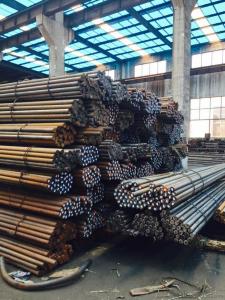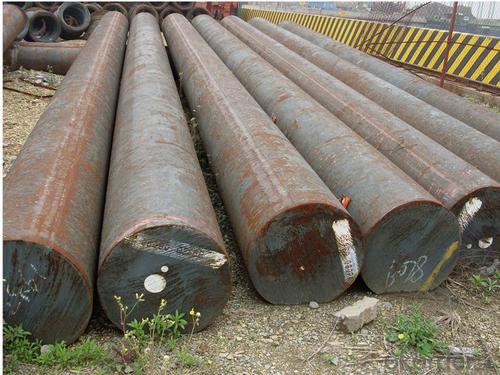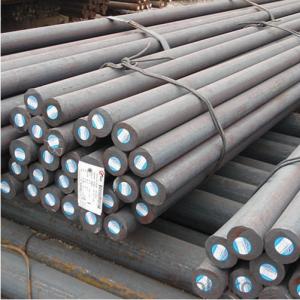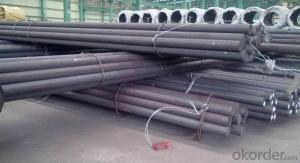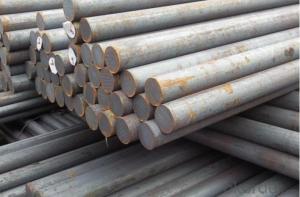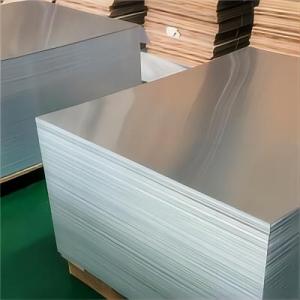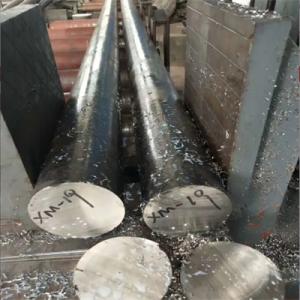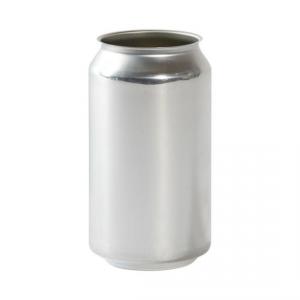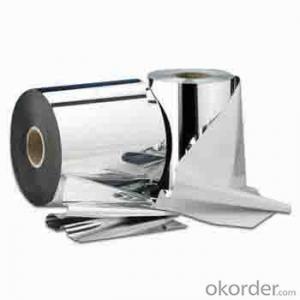Special Steel 1.2631 Round Steel / A8 Tool Steel Round Bar
- Loading Port:
- China main port
- Payment Terms:
- TT or LC
- Min Order Qty:
- 25 m.t.
- Supply Capability:
- 10000 m.t./month
OKorder Service Pledge
OKorder Financial Service
You Might Also Like
Specification
The details of our Steel
1. Produce Standard: as the GB, AISI, ASTM, SAE, EN, BS, DIN, JIS Industry Standard
2. Produce processes: Smelt Iron -EAF smelt Billet - ESR smelt Billet -Hot rolled or forged get the steel round bar and plate
3. Heat treatment:
Normalized / Annealed / Quenched+Tempered
4. Quality assurance:
All order we can received Third party inspection, You can let SGS, BV,.. and others test company test and inspect our products before Goods shipping.
Product information
Chemical Composition(%) of A8 steel round bar | C | Si | Mn | S | P | Cr | Mo | V |
0.90-1.05 | 0.20-0.40 | 0.40-0.70 | ≤0.035 | ≤0.035 | 4.80-5.50 | 0.90-1.20 | 0.10-0.30 | |
Specification of A8 steel round bar | Dia.*L=14~50mm*2000~5000mm | |||||||
Characteristic of A8 steel round bar | 1.good machinability and abrasivity 2.good hardness | |||||||
Application of A8 A8 steel round bar | 1.Precision Stamping Dies 2.Precison Blanking Dies of wire cutting process, and stamping dies for various uses 3.Tools for plactic deformation of hard processing material 4.Dies for forging, deep drawing and thread rolling 5.High speed blanking punch,stainless plates punch 6.Tensile modulus, crimping die, embossing dies, wear plastic molding mold | |||||||
Heart Treatment of A8 steel round bar | 1.Quench: 940-960°c oil cooling 2.Tempering temperature: 210~240 °C 3. Hardness: 61HRC | |||||||
Melting Process of A8 steel round bar | 1. EAF: Electric Furnace+LF+VD(Optional) 2. ESR: Electric Furnace+LF+VD+Eleroslag Remelted(Optional) | |||||||
Payment Term of A8 steel round bar | L/C or T/T, 30% in advance, 70% before the shipment | |||||||
Main product
Plastic Mould Steel
DIN 1.2311,1.2738,1.2083,1.2316 etc.
AISI P20,P20+Ni,420 etc.
JIS SUS420J2
Hot Work Steel
DIN 1.2344,1.2343,1.2367,1.2365,1.2581,1.2713 etc.
AISI H13,H11,H10,H21, etc.
JIS SKD61,SKD6,SKD5,SKT4 etc.
Cold Work Steel
DIN 1.2739, 1.2601, 1.2080, 1.2436, 1.2631, 1.263, 1.2510, 1.2327 etc.
AISI D2, D5, D3, D6, A8, A2, O1 etc.
JIS SKD10, SKD11, SKD1, SKS3 etc.
High Speed Steel
DIN 1.3343, 1.3243, 1.3247, 1.3355 etc.
AISI M2, M35, M42, T1 etc.
JIS SKH51, SKH35, SKH59, SKH2 etc.
Alloy Structural Steel
DIN 1.7035,1.6511,1.7220,1.7225 etc.
AISI 5140, 4340, 4135, 4140 etc.
JIS SCr440,SNCM439,SCM435,SCM440 etc.
Stainless & Carbon Steel or Others
DIN 1.4125,1.1191 etc
AISI 440C,1045, 1020 etc.
JIS SUS440C,S45C etc
Product show

Workshop show

Shipping
1. FedEx/DHL/UPS/TNT for samples, Door-to-Door;
2. By Air or by Sea for batch goods, for FCL; Airport/ Port receiving;
3. Customers specifying freight forwarders or negotiable shipping methods!
Delivery Time: 3-7 days for samples; 5-25 days for batch goods.
Payment Terms
1.Payment: T/T, L/C, Western Union, MoneyGram,PayPal; 30% deposits; 70% balance before delivery.
2.MOQ: 1pcs
3.Warranty : 3 years
4.Package Informations: 1) EXPORT, In 20 feet (GW 25 ton) or 40 feet Container (GW 25 ton)
2)as customer's requirement
Why choose us?
(1) The leading exporter in China special steel industry.
(2) Large stocks for various sizes, fast delivery date.
(3) Good business relationship with China famous factories.
(4) More than 7 years steel exporting experience.
(5) Good after-sales service guarantee.
- Q:Can special steel be used in the power generation industry?
- Yes, special steel can be used in the power generation industry. Special steel alloys are commonly used in various power generation components such as turbines, boilers, and generators due to their high strength, corrosion resistance, and heat resistance properties. These alloys are designed to withstand extreme temperatures and pressures, ensuring the reliable and efficient operation of power generation equipment.
- Q:What are the requirements for special steel used in ballistic protection?
- The requirements for special steel used in ballistic protection are quite stringent and specific. Firstly, the steel should possess a high level of hardness and strength to effectively withstand the impact of ballistic threats. This is typically achieved through the addition of alloying elements such as chromium, nickel, and molybdenum, which enhance the steel's strength and hardness. Additionally, the steel should exhibit excellent toughness and ductility to prevent brittle fracture upon impact. This is crucial as it ensures that the steel can absorb and dissipate the energy from the ballistic threat, reducing penetration and minimizing the risk of injury. Furthermore, the special steel used in ballistic protection should have exceptional resistance to deformation and penetration. It should be able to resist deformation even under high-velocity impact, maintaining its structural integrity and preventing the penetration of the ballistic threat. Another important requirement is good weldability, as many ballistic protection components are typically assembled through welding. The steel should have low susceptibility to cracking during the welding process, allowing for the fabrication of strong and reliable ballistic protection systems. Lastly, the special steel used in ballistic protection should possess excellent corrosion resistance. This is necessary to ensure the durability and longevity of the protective equipment, especially in environments where exposure to moisture, chemicals, or harsh weather conditions is likely. To meet these requirements, various types of special steel have been developed, such as high-hardness armor steel, ballistic steel, and armor-piercing steel. These steels are often subject to rigorous testing and certification processes to ensure they meet the necessary ballistic protection standards.
- Q:What are the different methods for improving the corrosion resistance of special steel?
- There are multiple techniques available to enhance the corrosion resistance of special steel. 1. Alloying: Adding alloying elements, like chromium, nickel, and molybdenum, to the steel composition is a widely used method. These elements create a protective layer on the steel surface, preventing corrosion. For instance, stainless steel contains a substantial amount of chromium, which forms a passive film that shields the steel from corrosive surroundings. 2. Surface treatments: Diverse surface treatments can be applied to special steel to augment its corrosion resistance. These treatments include electroplating, hot-dip galvanizing, and chemical passivation. Electroplating involves coating the steel with a layer of zinc or nickel, serving as a sacrificial anode that safeguards the steel from corrosion. Hot-dip galvanizing entails immersing the steel in molten zinc to form a durable and corrosion-resistant layer. Chemical passivation involves treating the steel with a solution that eliminates surface impurities and forms a protective oxide layer. 3. Protective coatings: The application of protective coatings can considerably enhance the corrosion resistance of special steel. Coatings like paint, epoxy, or polyurethane act as barriers, preventing moisture and corrosive substances from contacting the steel surface. These coatings can be applied through spray, dip, or powder coating methods. 4. Heat treatment: Modifying the microstructure of special steel through heat treatment improves its corrosion resistance. Processes like annealing, quenching, and tempering can alter the steel's properties, making it more resistant to corrosion. Heat treatment can also alleviate internal stresses that contribute to corrosion. 5. Environmental control: Controlling the environment in which the special steel is utilized can also aid in improving its corrosion resistance. This includes maintaining appropriate humidity levels, controlling pH, avoiding exposure to corrosive chemicals, and implementing effective ventilation systems. By minimizing the exposure of special steel to corrosive elements, its corrosion resistance can be enhanced. In conclusion, a combination of these methods can be employed to enhance the corrosion resistance of special steel, ensuring its durability and performance in corrosive environments.
- Q:What are the specific requirements for special steel used in the oil and gas sector?
- The specific requirements for special steel used in the oil and gas sector are primarily focused on its ability to withstand harsh and demanding environments. Some of the key requirements include: 1. Corrosion Resistance: Special steel used in the oil and gas sector must have excellent resistance to corrosion caused by various factors such as moisture, chemicals, and high temperatures. This ensures the longevity and reliability of the equipment in corrosive environments. 2. High Strength: The steel must possess high strength and toughness to withstand the extreme pressure, stress, and load conditions experienced in oil and gas operations. This is crucial for ensuring the structural integrity of equipment like pipelines, offshore platforms, and drilling components. 3. Low Temperature Resistance: Oil and gas operations often involve working in extremely low-temperature conditions, especially in deep-sea exploration or Arctic regions. Special steel used in such applications must have good low-temperature toughness to prevent brittle fracture and maintain its mechanical properties. 4. Weldability: Special steel used in the oil and gas sector should exhibit good weldability to ensure ease of fabrication and construction. This is crucial for joining various components and pipelines together, ensuring structural integrity and minimizing the risk of failure. 5. Resistance to Hydrogen-Induced Cracking (HIC): In the presence of hydrogen sulfide gas, which is common in many oil and gas environments, special steel must have resistance to hydrogen-induced cracking. HIC can lead to catastrophic failures, so the steel must be specifically designed to prevent this phenomenon. 6. Sour Service Resistance: In certain oil and gas fields, the presence of hydrogen sulfide and other corrosive gases necessitates the use of special steel that can withstand sour service conditions. The steel must have high resistance to sulfide stress cracking and exhibit good mechanical properties under these harsh conditions. 7. Compliance with Industry Standards: Special steel used in the oil and gas sector must meet specific industry standards and specifications, such as those set by the American Petroleum Institute (API), to ensure quality, reliability, and safety. Overall, the requirements for special steel used in the oil and gas sector are driven by the need for durability, reliability, and safety in challenging operating environments. These requirements may vary depending on the specific application within the industry, but they are all critical for ensuring the smooth and efficient functioning of oil and gas operations.
- Q:How does special steel contribute to the manufacturing of cutting tools?
- Special steel is a key component in the manufacturing of cutting tools due to its exceptional properties such as high hardness, toughness, and wear resistance. These characteristics enable cutting tools to withstand the rigors of various cutting operations, ensuring longer tool life and improved cutting performance. Furthermore, special steel can be customized to meet specific requirements, making it an ideal choice for manufacturing cutting tools that are used in a wide range of industries, including automotive, aerospace, and manufacturing.
- Q:How does the composition of special steel affect its properties?
- The composition of special steel greatly affects its properties. By adjusting the amounts of elements like carbon, manganese, chromium, and nickel, the steel's hardness, strength, corrosion resistance, and heat resistance can be modified. Additionally, the presence of specific elements can also enhance other properties such as toughness, wear resistance, and machinability. Therefore, careful control of the composition allows manufacturers to tailor the steel's properties to meet specific requirements for different applications.
- Q:What are the different coating materials used for special steel?
- There are several different coating materials used for special steel, including zinc, aluminum, nickel, tin, and epoxy-based coatings. These coatings are applied to enhance the corrosion resistance, improve durability, and provide a decorative finish to the special steel.
- Q:What are the main factors affecting the creep rupture strength of special steel?
- The creep rupture strength of special steel is influenced by various key parameters. These factors can be categorized into several categories. Firstly, temperature plays a significant role in determining the creep rupture strength of special steel. The operating temperature affects atomic diffusion and dislocation movement, which in turn leads to accelerated deformation and eventual failure. Higher temperatures can greatly reduce the creep rupture strength of special steel. Secondly, the time duration of the applied load also affects creep rupture strength. Creep is a time-dependent phenomenon, meaning that the longer the steel is under stress, the more likely it is to experience rupture. The relationship between time and creep rupture strength is usually described by a power law equation, with longer durations resulting in lower rupture strength. The stress level is another critical factor that influences creep rupture strength. Higher levels of stress lead to faster deformation and shorter time to rupture. Therefore, it is important to ensure that the stress applied to special steel remains within an acceptable range to maintain its desired creep rupture strength. The microstructure of special steel is crucial in determining its creep rupture strength. Factors like grain size, grain boundary characteristics, and the presence of alloying elements all impact the steel's resistance to creep deformation and rupture. Fine-grained microstructures with a high density of grain boundaries tend to exhibit better creep resistance and higher rupture strength. The chemical composition of special steel also significantly affects its creep rupture strength. The addition of certain alloying elements, such as chromium, molybdenum, and vanadium, enhances the steel's high-temperature strength and resistance to creep deformation. These elements form stable carbides that hinder dislocation movement and improve the material's creep rupture strength. Furthermore, the heat treatment process used to modify the microstructure of special steel can also impact its creep rupture strength. Proper heat treatment optimizes grain size, the distribution of alloying elements, and overall microstructure, resulting in improved creep resistance and higher rupture strength. In conclusion, the creep rupture strength of special steel is influenced by temperature, time, stress level, microstructure, composition, and heat treatment. Understanding and controlling these parameters are vital in ensuring the desired performance and reliability of special steel in high-temperature and long-term applications.
- Q:How does special steel perform in abrasive environments?
- Special steel performs exceptionally well in abrasive environments. Its high hardness and resistance to wear make it ideal for applications where there is constant contact with abrasive materials. Special steel can withstand the impact and friction caused by abrasive particles, ensuring longevity and durability in such environments. Additionally, its corrosion resistance properties prevent the steel from deteriorating due to exposure to moisture or chemicals commonly found in abrasive environments. Overall, special steel is specifically designed to excel in abrasive conditions, providing optimal performance and reliability.
- Q:How is special steel used in the production of gears?
- Special steel is used in the production of gears due to its high strength, durability, and resistance to wear and fatigue. It provides the necessary toughness and hardness required to withstand the stresses and loads that gears experience during operation. Additionally, special steel can be heat treated to enhance its properties, ensuring precise dimensions and improving the overall performance and lifespan of gears.
1. Manufacturer Overview |
|
|---|---|
| Location | |
| Year Established | |
| Annual Output Value | |
| Main Markets | |
| Company Certifications | |
2. Manufacturer Certificates |
|
|---|---|
| a) Certification Name | |
| Range | |
| Reference | |
| Validity Period | |
3. Manufacturer Capability |
|
|---|---|
| a)Trade Capacity | |
| Nearest Port | |
| Export Percentage | |
| No.of Employees in Trade Department | |
| Language Spoken: | |
| b)Factory Information | |
| Factory Size: | |
| No. of Production Lines | |
| Contract Manufacturing | |
| Product Price Range | |
Send your message to us
Special Steel 1.2631 Round Steel / A8 Tool Steel Round Bar
- Loading Port:
- China main port
- Payment Terms:
- TT or LC
- Min Order Qty:
- 25 m.t.
- Supply Capability:
- 10000 m.t./month
Offcanvas right
OKorder Service Pledge
OKorder Financial Service
Similar products
New products
Hot products
Hot Searches
Related keywords
